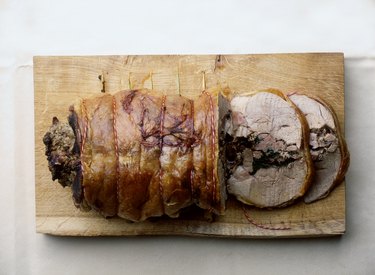
With its mild flavor and juicy consistency, pork loin is ideal for a quick weeknight dinner or a special holiday meal — it all comes down to how you cook it. For a simple yet delicious dish, roast pork loin with sauerkraut and potatoes. It's easy to prepare and tastes like heaven in your mouth.
Tip
Pork loins are fairly tender and easy to cook. For best results, roast them at 375 degrees Fahrenheit for approximately 20 minutes per pound or until their internal temperature reaches at least 145 F.
Video of the Day
What Is a Pork Loin?
This tender cut of pork meat comes from the area between the back and shoulder. It's fairly lean and can be divided into steak-like cuts, such as rib roasts, rib eye chops, sirloin chops and sirloin roasts. Depending on your preferences, you can grill, roast or fry it. Just make sure you don't overcook it.
Video of the Day
Pork loins are available both boneless and bone-in and have a thick fat cap that can be removed before or after cooking. A 4-ounce serving (boneless) provides about 220 calories, 24 grams of lean protein, 14 grams of fat and 8 percent of the daily recommended intake of iron, according to the USDA.
In a small study published in Nutrients in February 2014, subjects with overweight and obesity who consumed 2.2 pounds of pork weekly for nine months experienced similar changes in body composition as those eating beef or chicken.
These findings make sense, considering that today's pork has 16 percent less fat compared to 26 years ago. Some cuts are just as lean as skinless chicken breast.
Bone-in Pork Roast With Sauerkraut
The nutritional value of pork roast depends largely on the ingredients used. French fries, sauces and other extras can significantly increase its calorie count. Instead, serve it with healthy sides, such as sauerkraut and sweet potatoes.
According to a November 2014 review published in Global Advances in Health and Medicine, sauerkraut is loaded with vitamins, minerals and other micronutrients that may prevent scurvy, reduce inflammation and improve estrogen metabolism. The downside is that it may cause allergic reactions and diarrhea in some individuals. However, there's no reason to avoid sauerkraut unless you're allergic to it. This functional food is a powerhouse of nutrition, offering large amounts of vitamin C, vitamin K, iron and potassium.
Read more: Without a Doubt, Sauerkraut Is Great for Your Health
Whether you want to cook a boneless or a bone-in pork roast with sauerkraut and potatoes, you'll follow pretty much the same steps. First, preheat the oven to 375 degrees Fahrenheit, as recommended by the National Pork Board. Season it with olive oil, cumin, cilantro, curry, paprika and other spices for a delicious flavor.
Depending on how many people you're serving, add three or four potatoes cut into chunks and two or three cups of drained sauerkraut to a large baking dish greased with olive oil. Place the meat with the fatty side up on top of them.
Roast the pork loin with sauerkraut and potatoes until the meat reaches at least 145 F, advises the U.S. Department of Health & Human Services. Once it's done, let it rest for three minutes or longer.
Similarly, you can cook pork tenderloin with sauerkraut and potatoes — just follow the above steps. If you opt for bone-in pork loin, place it on a carving board before serving. Position the rib side toward you and carve between the bones. If you've chosen a boneless roast, cut it against the grain into slices.
- USDA: "Nutrition Facts for Boneless Premium Pork Loin"
- Nutrients: "A Comparison of Regular Consumption of Fresh Lean Pork, Beef and Chicken on Body Composition: A Randomized Cross-Over Trial"
- National Pork Board: "Pork Nutrition"
- Global Advances in Health and Medicine: "Regular Consumption of Sauerkraut and Its Effect on Human Health: A Bibliometric Analysis"
- USDA: "Nutrition Facts for Sauerkraut"
- National Pork Board: "Cooking a Pork Loin Roast"
- U.S. Department of Health & Human Services: "Meat and Poultry Charts"